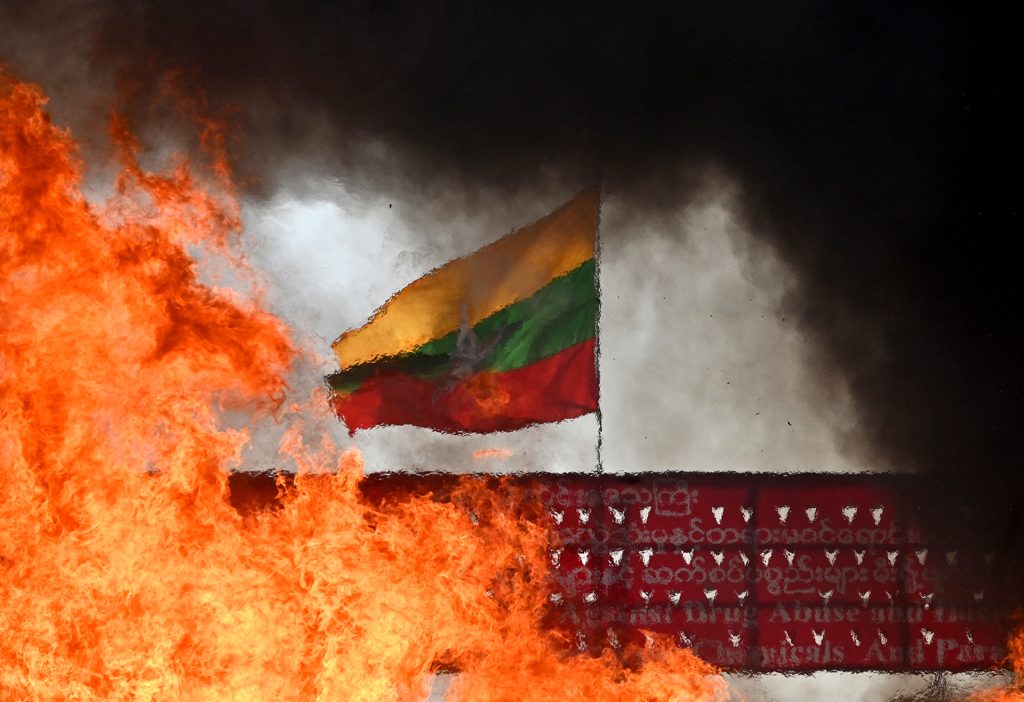Insight Email No. 23
This Insight Email is published on September 18, 2023, as a translation of the original Burmese language version that ISP-Myanmar sent out to the ISP Gabyin members on September 15, 2023.
The weather in Naypyitaw is gloomy with unpredictable clouds and rainfall. For this week’s insight email No. 23, ISP-Myanmar focuses on developments relating to Naypyitaw. The newsletter also highlights a growing substance abuse problem in Myanmar with illicit drugs easily accessible in most townships, as demonstrated by ISP-Myanmar’s socio-economic survey. The bulletin also discusses China’s leading role in the suppression of cyber-slavery in the region as well as the outcomes of the 43rd ASEAN Summit. While it remains disheartening to witness Myanmar’s internal conflict persisting, the SAC’s economic mismanagement brings yet more misery to the people of Myanmar. To the north, while India recently had a moment of national pride after the Moon mission, there is another face of India to be seen in the Manipur crisis.
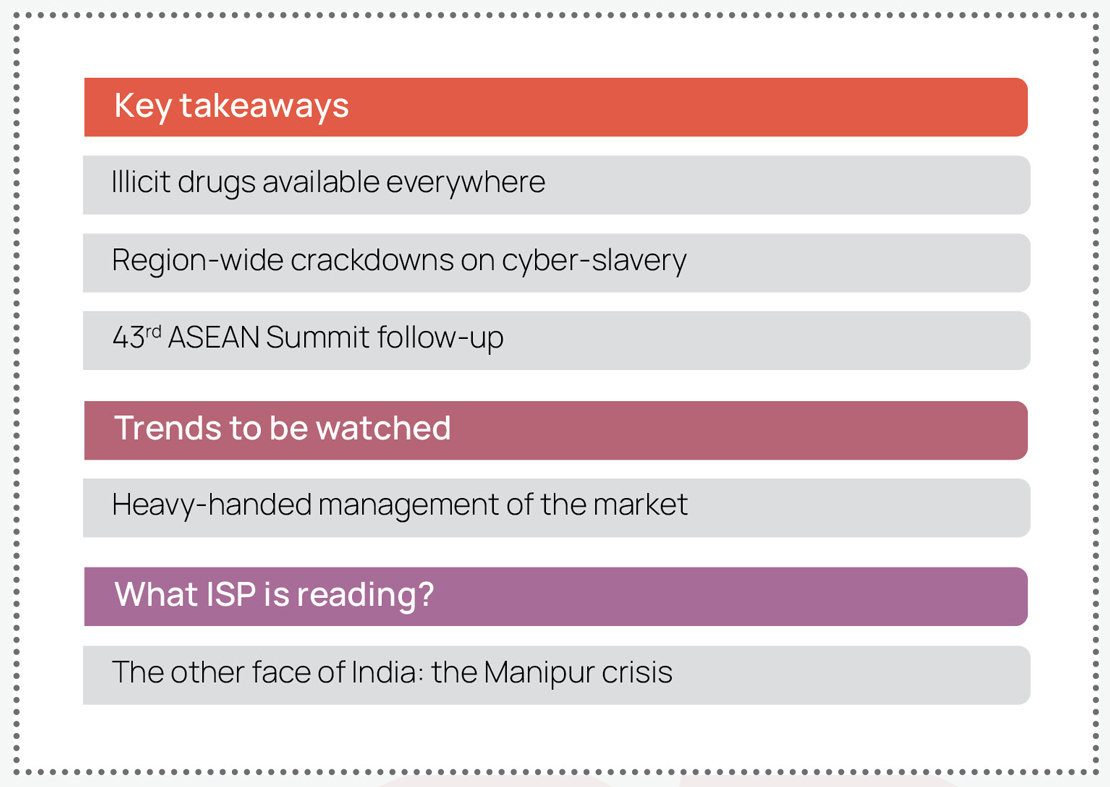
∎ Key takeaways
1.Illicit drugs available everywhere
ISP-Myanmar’s latest findings shed light on the alarming issue of substance abuse in Myanmar, as revealed by our own socio-economic survey. This three-month study underscores the widespread availability of various illicit substances, including marijuana, different types of tablets, ketamine, and ice, particularly among the youth in many townships. In 93 of those 110 townships surveyed, several kinds of illicit substances were found to be easily accessible. The study shows that in Muse, Dala, and Insein Townships, there are more than 100 points of contact where drugs are available. The situation in Kengtong Township is particularly alarming with at least 250 locations for accessing drugs. According to July’s survey result, in 94 of those 110 townships surveyed (85 percent), marijuana was the most widely used substance. Following closely were Ya Ba (or WY) and Ecstasy (E), while glue sniffing ranks as the third most common form of drug abuse. Many young people also use cocaine, various forms of methamphetamine, and ketamine.
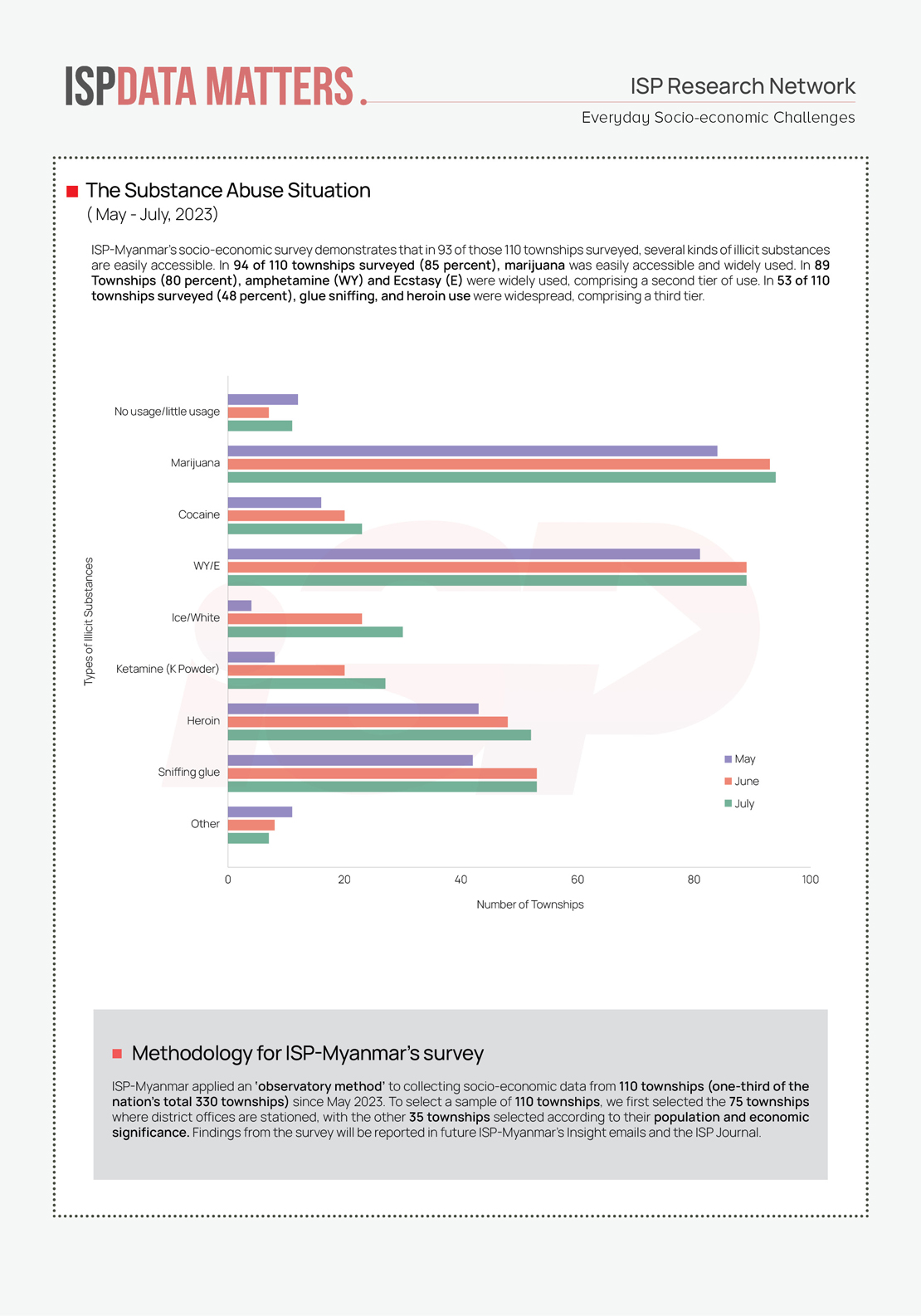
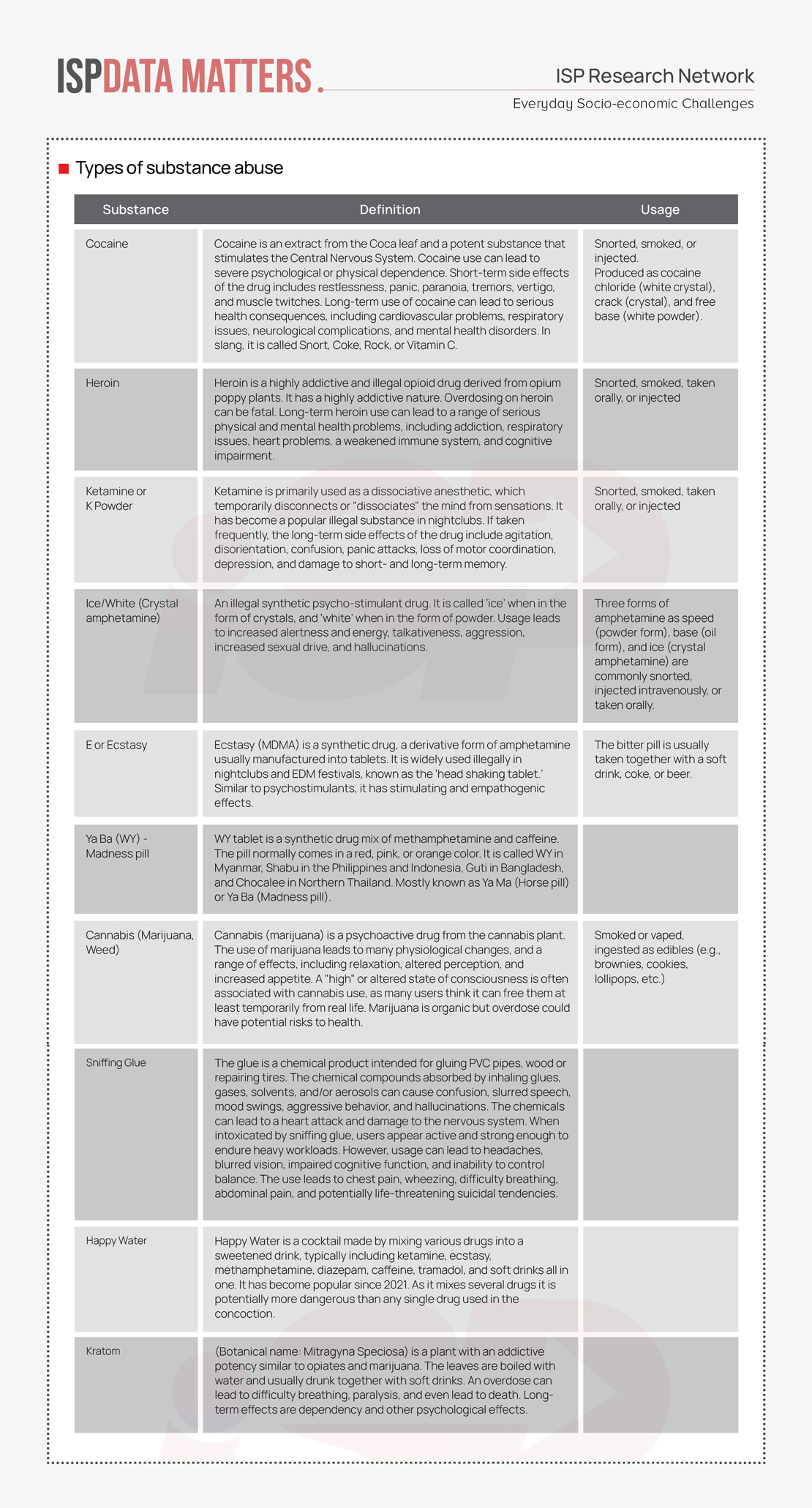
United Nations Office on Drugs and Crime (UNODC) in 2023 reported that since the military takeover, there has been an increase of 33% in the opium cultivation (See ISP Insight Email No. 9). Similarly, the Transnational Institute (TNI), a Netherlands-based research and advocacy organization, pointed out that the SAC has focused on cracking down on its political opponents which has weakened its anti-drug efforts. As the armed conflict has widened, law enforcement officials have lacked the capacity to intercept drug trafficking, and the illicit trade has grown along with the war economy. Illicit drugs have now become cheap and easily accessible.
According to the SAC’s data on destroyed seized substances, they destroyed USD 301 million worth of substances in 2019, USD 839 mil-lion worth of substances in 2020, USD 667 million worth of substances in 2021, USD 642 million worth of substances in 2022, and USD 446 million worth of substances in 2023. The amount and value of seized substances do not seem to be increasing when compared with the data of 2020, prior to the military coup.
2.Region-wide crackdowns on cyber-slavery
Successive attempts to crack down on online scam gangs in countries peripheral to China have been initiated by the Chinese govern-ment. These criminal triads have become a major threat as they commit human rights abuses in their human trafficking activities. Many of these criminal gangs are based in Southeast Asian countries, including Myanmar. In Myanmar, Wa State authorities recently arrested and deported at least 1,200 suspects to Chinese police for involvement in online scams. Similarly, the Myanmar junta in col-laboration with China’s Xishuangbanna Dai Autonomous Prefecture’s police arrested 269 people and deported them to China.
Online scams have now grown from the original organized criminal activities of fraud and human trafficking to become a global threat says a recent report by the UN Office of the United Nations High Commissioner for Human Rights (OHCHR). The criminal industry is booming in border areas of Myanmar, Laos, Cambodia, neighboring China, and also in some cities (See ISP Insight Email No. 9). Some analysts claim the threat is a ‘global human trafficking crisis’ or ‘cyber-slavery’, which has become a multi-billion dollar industry. A New York Times report estimated the fraud industry made at least 12 billion USD alone in Cambodia. According to a Nikkei Asia re-port, there could be at least 100,000 forced laborers in Cambodia and at least 120,000 in Myanmar.
Chinese nationals are one of the main targets of online scams and many Chinese nationals are involved in the crime syndicates. For this reason, the Chinese government has pursued an aggressive policy against organized crime groups. China has also been asking for more cooperation with Southeast Asian countries in such efforts. Such joint operations could result in the release of thousands of traf-ficked victims, but many obstacles are involved. For instance, Cambodia’s former Prime Minister showed his political will to fight such fraud and prohibited online gambling in his nation. But deep-rooted corruption has meant the laws have not been as successful as promised. The fight against organized crime needs the political commitment of national leaders, along with the ongoing fight against deep-rooted corruption within their own societies in order to make progress.
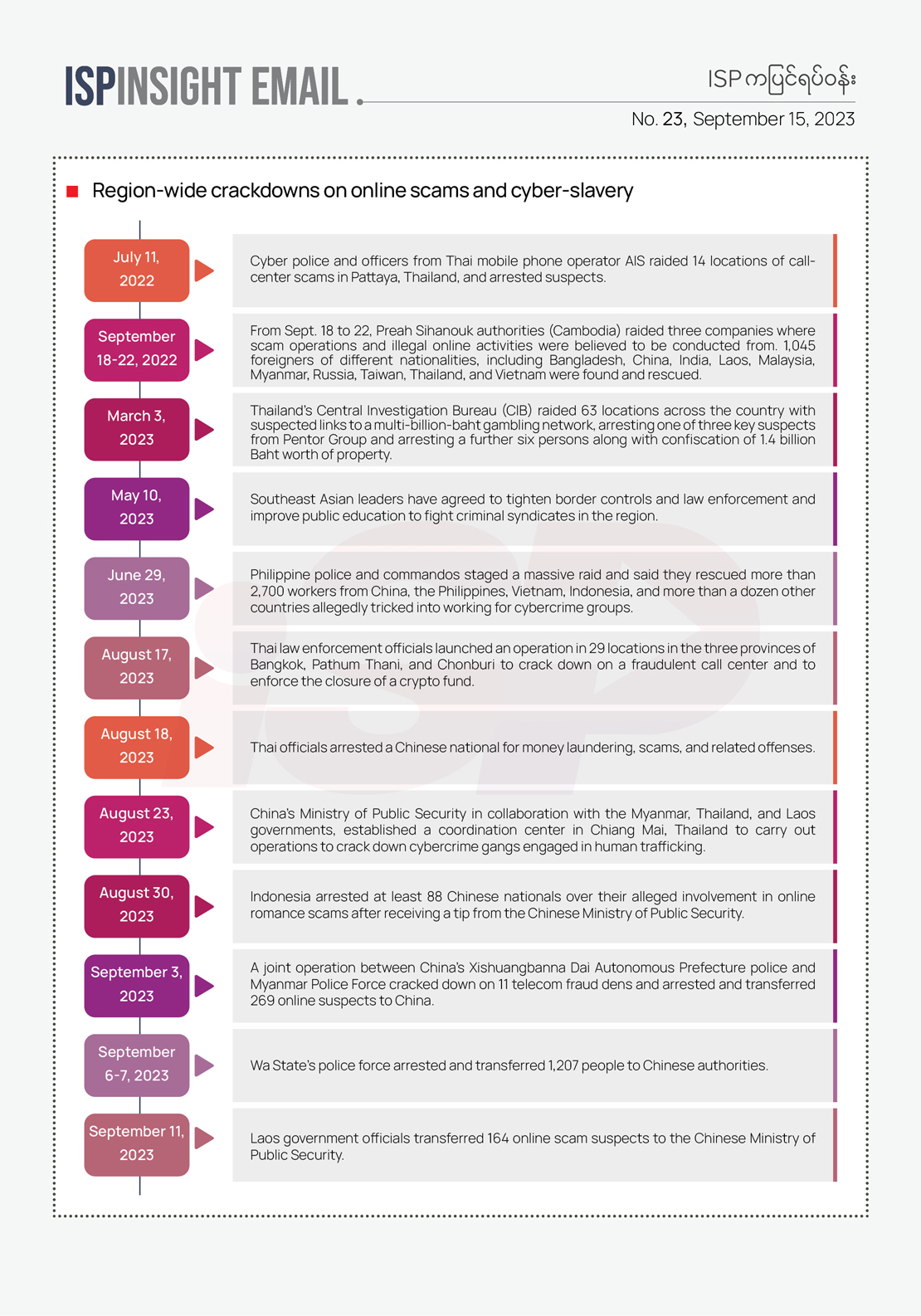
3.ASEAN 43rd Summit Follow-up
As the final meeting to be held with Indonesia as chair, the 43rd Association of South East Asian Nations (ASEAN) Summit was held between September 4-7 with the theme ‘ASEAN Matters: Epicentrum of Economic Growth.’ As is now customary, the association did not invite Myanmar’s top SAC leadership to the Summit. ASEAN leaders confirmed the decision to hand the chair to the Philippines in 2026, instead of the conventional rotation to Myanmar, and reviewed the five-point consensus (5PC) for restoring peace and stability in Myanmar. ASEAN has also decided to establish a ‘Troika of chairs’ — Indonesia, Laos, and Malaysia — in a new move to handle the Myanmar crisis. This ‘Troika of chairs’ means a team of previous, current, and upcoming ASEAN chairs will lead the discussion on Myanmar.
President Joko Widodo reiterated that ASEAN needs an extraordinary tactical strategy to face the current global turmoil at the opening speech of the 43rd ASEAN Summit. Before the 43rd summit began, ASEAN leaders held a two-day meeting for the ASEAN Indo-Pacific Forum (AIPF), and to finalize the ASEAN Outlook on the Indo-Pacific (AOIP) after a delay of more than three years since 2019.
The ASEAN Summit and related meetings resulted in 21 outcome documents, including the main ‘Jakarta Declaration: ASEAN Matters: Epicentrum of Economic Growth,’ the ASEAN Digital Economy Agreement (DEA), which aims to boost digital trade in the region by up to USD 600 billion by 2030, a strategy for formulating a carbon neutrality plan to promote a ‘green economy’ and sustainable growth, implementation of Regional Comprehensive Economic Program (RCEP), and ASEAN Trade in Goods Agreement (e-Form D). The lead-ers also deliberated on a discourse for a ‘Post-2025 Vision for ASEAN integration.’
The Myanmar junta made a statement that it had consulted with the Philippines on the transfer of the ASEAN chairmanship ahead of the decision. Myanmar stated that the decision to transfer the chairmanship for 2026 to the Philippines was done ‘taking into consideration of Myanmar’s current priorities.’ While other regional countries are advancing into a new level for growth, Myanmar is being left behind, likely ‘taking into consideration of Myanmar’s current priorities.’
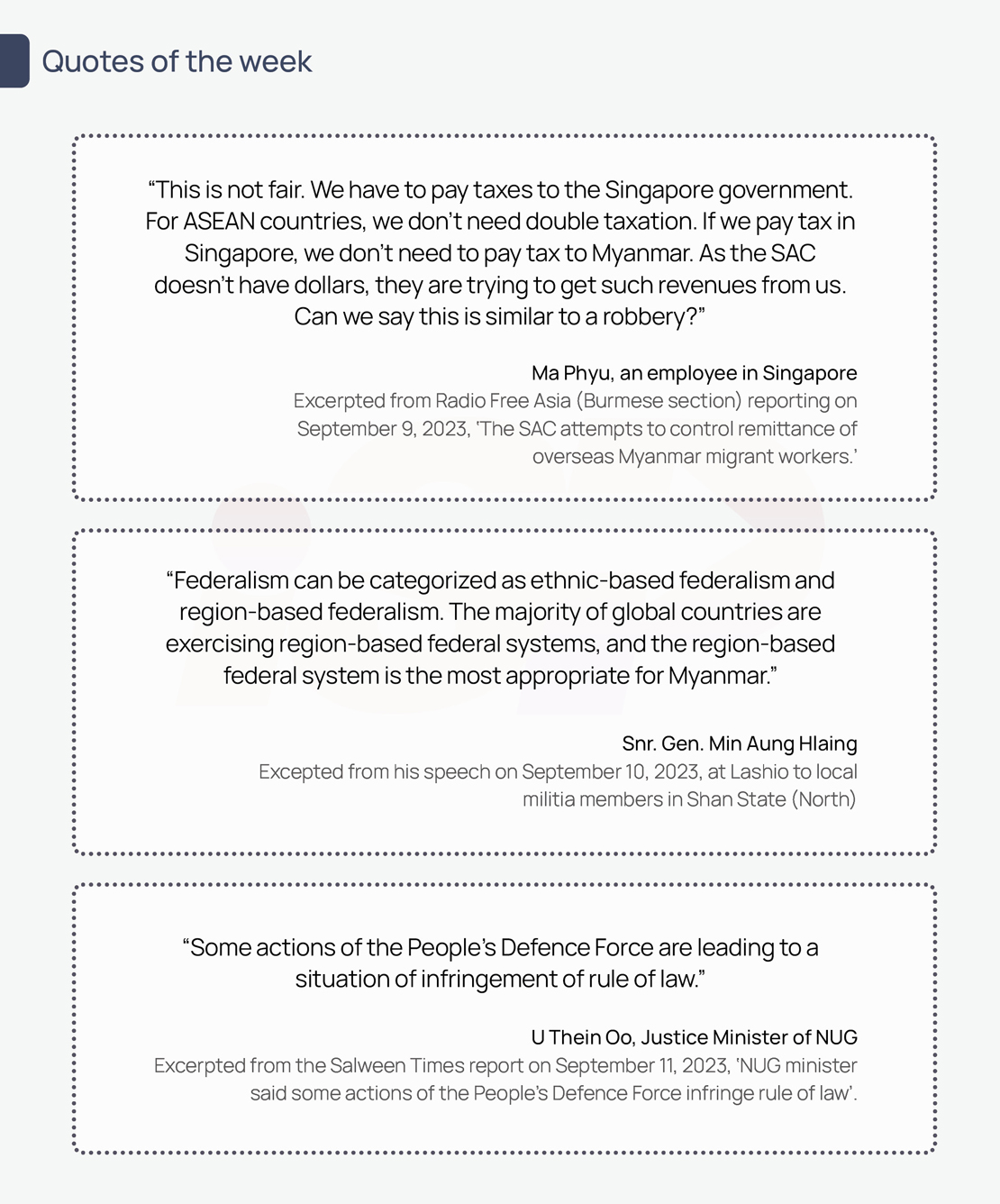
∎ Trends to be watched
Heavy-handed management of the market
Myanmar’s 2008 constitution explicitly states in Section 35 that ‘the economic system of the Union is a market economy system.’ However, the revised version of the SAC’s economic objectives does not even mention the word ‘market economy.’ What is currently happening instead is the SAC heavy-handedly managing the economy, with the state deeply intervening into market operations. After the SAC initiated foreign currency controls, it followed up by limiting import and export licenses, and ultimately by arresting hundreds of merchants and traders naming them as ‘greedy individuals.’
On his tour to Lashio, Shan State (North) on September 9, SAC Chairman Min Aung Hlaing said “Several com-modity prices increased beyond proper levels because some greedy individuals manipulated the situation though the government oversees the market.” He confirmed taking harsh action against them. Prior to this speech, Maj. Gen. Yan Naung Soe, chief of the National Trade Facilitation Committee was detained and put under investiga-tion, along with a hundred officials from the Trade and Commerce Department, as well as traders, BBC (Burmese section) reported. The number of arrests has since grown. Unconfirmed sources have said that high officials are among the detainees, including Lt. Gen. Moe Myint Tun, a member of SAC who had led the economic sector as chief of the State Investment Commission, as well as former Home Minister, Lt. Gen. Soe Htut. Sources also re-ported that Lt. Gen. Nyo Saw, recently appointed economic advisor to the SAC, is leading almost all commis-sions/committees relating to economic affairs. The latest arrests and investigations began after the appointment of a military officer, Aung Zaw Lin as Tzar of the Special Investigation Bureau (BSI) on September 7, 2023.
The new round of investigations was initiated against importers and exporters, who enjoy access to US Dollars at the official rate of 2,100 Kyats to the US Dollar, mostly with traders working on corn, cooking oil, rice, and fuel. The investigation was later expanded to include to some bank officials. Later, according to information from the detained traders, chemical companies were also raided as they had been using chemicals to convert low-grade fat into cooking oil. Many cooking oil traders from Yangon’s Thein Gyi market Hall-A, chemical traders from Panbedan 27th-28th Streets, and Kone-Zay-Tan Street of Yangon were raided in dramatic fashion. Similar arrests happened in Mandalay. An unconfirmed report said the major shareholder of a leading telecommunication com-pany in Myanmar, ATOM, Thein Win Zaw (of Shwe Byine Phyu business group) was called in and questioned. It is still uncertain how the SAC will handle the VVIP companies, those who enjoyed special rights and treatments in business sector since the coup.
It is quite acceptable to quell unscrupulous businesses, but the action should avoid causing panic and chaos across the whole business environment. The state should maintain a stable and conducive commercial environment. The economy should be operating on a rules-based order and the state must acknowledge the role of ‘incentives’ for the private sector. There is a question, of whether these arrests could lead to the right setting for Myanmar’s economy. It could conversely lead to more uncertainty and encourage the growth of an illegal economy. Recently the unofficial black-market rate for Myanmar Kyat has appreciated to 3,100 Kyats to the US Dollar, up from recent historic lows of around 3,600. But this slight positive movement comes against a sluggish market while official currency trade remains effectively frozen. It will be interesting to see the effect on Myanmar’s economy after the arrests of these ‘Big fish.’
∎ What ISP is reading?
The other face of India: the Manipur crisis
India recently had a moment of national pride after successfully launching the lunar expedition Chandrayaan-3 to the South pole of the Moon. But sadly, some parts of the country are in crisis. In Manipur, a state in the northeast of India, ethnic violence is smoldering without a sustainable solution. Since May 2023, communal violence has caused 150 deaths, and at least 60,000 people have been forcefully evicted from their homes. In ongoing violence, mobs have attacked each other and damaged places of worship, including 220 churches and at least 17 Hindu temples. India’s national government has imposed Section 144, deployed more than 40,000 soldiers and police, and ordered a ‘shoot on sight’ policy towards any crowd violence. India’s Supreme Court has described the Mani-pur violence as “an absolute breakdown of law and order.”
India’s northeast states have been marked by unrest and separatist movements. In Manipur, there were once at least 20 active armed groups, with some entering ceasefire agreements with the central government, others be-coming defunct, while some new groups emerged. Of Manipur’s population of 3.3 million, the Meiti ethnic group comprises the majority, mostly living in plain valleys. Kuki (Chin) and Naga tribes though comprise 43 percent of the state population. They mostly live in mountainous areas. The Meiti majority effectively governs the Manipur State government, with Mr. N. Biren Singh of the BJP party currently Chief Minister. In the state legislature, 40 out of 60 elected representatives are Meiti. The remaining 20 representatives are reserved for scheduled tribes, of which one representative is reserved for a scheduled caste. Among the minority ethnic representatives, eight out of ten Kuki elected representatives are members of the BJP party. The BJP currently governs India’s central gov-ernment, and the Manipur government is well supported by the central administration.
India’s federal system allows minorities of mountain tribes to control their own land as a ‘scheduled tribe.’ In May this year, the Meiti majority of Manipur sought a similar ‘scheduled tribe’ status, leading to tensions rising among the local population. Manipur Chief Minister, N. Biren Singh blamed illegal migrants and drug lords from Myan-mar for the lingering violence, claiming such forces were trying to destabilize the state. This assertion came in response to Meiti protests against what they referred to as “Chin-Kuki narco-terrorism.” Conversely, Kuki-Zo communities accused Chief Minister N. Biren Singh of orchestrating a ‘state-sponsored ethnic cleansing program.’ This volatile situation culminated in fresh outbreaks of mob violence in the India-Myanmar border town of Moreh.
India and Myanmar share a 1,624-kilometer border, 398 kilometers of which is a porous border with Manipur State. In India’s Mizoram State, the situation with Chin migrants has been relatively manageable, especially fol-lowing the military coup in Myanmar. The state government has provided assistance to refugees in need. Sources report there are around 35,000 Chin from Myanmar who are currently taking refuge in Mizoram State and at least 15,000- 20,000 in Manipur State. The Manipur government has initiated a program which collects biometric data from Myanmar migrants with reports indicating that this initiative has been completed for 2,500 individuals.
Within the context of India’s relationship with Myanmar, India has consistently emphasized the significance of its ‘Look East’ policy. This approach aims to foster extensive economic and strategic ties with Southeast Asian nations. India has demonstrated its commitment through investments in Myanmar, such as the Kaladan Multi-modal Transit Transport Project, and by actively pursuing a trilateral highway project linking India, Myanmar, and Thai-land. However, the successful execution of these projects faces potential suspension due to ongoing social and communal instability. Far worse, Manipur authorities have seemingly been scapegoating Myanmar’s refugees, which could directly impact the welfare and security of refugees in India. In contrast, China has managed to maintain relative stability in its border states through strategic investments and economic growth. However India’s frontier management seems conservative and cannot escape underlying racial and ethnic conflicts. While India has had some successes in the space, problems persist in this ‘other face’ of India.
To receive ISP Insight Emails in your inbox, subscribe at this link.

